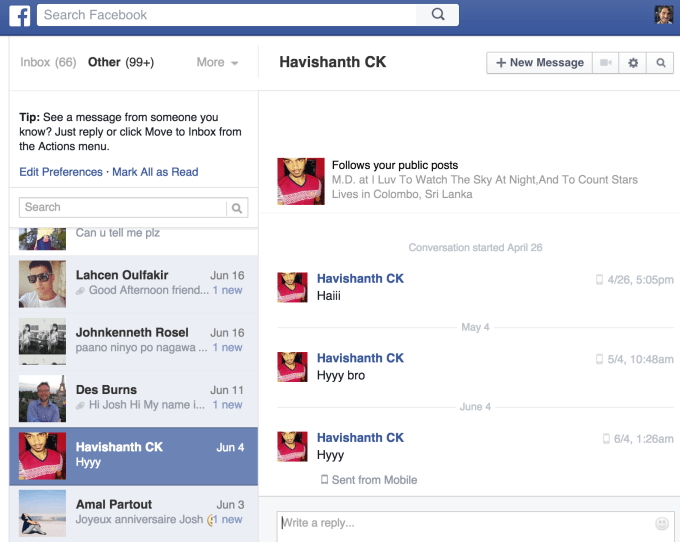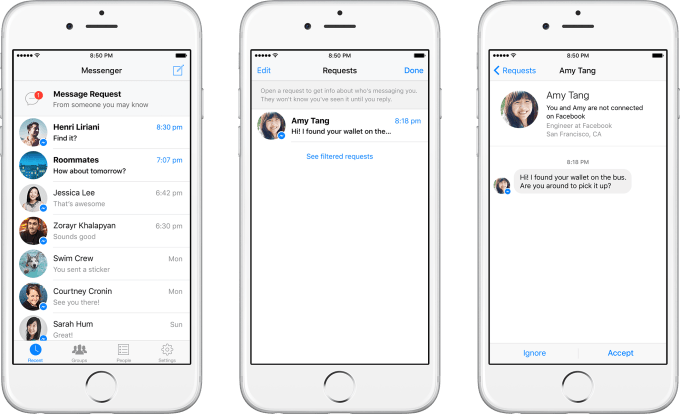Phone numbers are dumb. Once someone has yours, you can’t stop them from contacting you.
Someone might want you to call them, but if you don’t have their random string of digits, you can’t. And you could miss something extremely important if a person you’ve never met really needs to reach you.
Facebook Messenger has a plan to fix all that. And it’s born from the ashes of one of the social network’s worst products ever.
No More Missed Connections
Today, Messenger is killing off the dysfunctional “Other Inbox”. It was where Facebook messages went to die if they were sent by someone who wasn’t your friend or friend-of-a-friend. Few people knew it existed. Fewer ever checked it. And it wasn’t even accessible from Messenger’s iOS or Android apps.
A friend of mine once received a Facebook message from his long-lost brother he was separated from at birth 30 years ago in Vietnam. But he didn’t see the message for six months because it went to his Other Inbox. It took a LinkedIn request before he realized what he was missing.

Thankfully, that shouldn’t happen anymore. Rolling out globally starting today is Facebook’s replacement for the Other Inbox which it calls “Message Requests”. It means all someone needs in order to contact you is your name, but you have control over whether they can contact you again.
Friend Requests For Chat
Now, any message from a non-friend who doesn’t have your phone number will go into your Message Requests at the top of Messenger on mobile or in the Messages tab on web.

From there, you can parse who to respond to and who to permanently ignore. You’ll see the sender’s name, a little public info about them like their city, job, or mutual friends, and the message.
But the sender won’t know you looked. Respond and the thread goes to your normal inbox, ignore and it’s hidden in the Filtered Requests folder along with anything that seems like spam.
If you already have a thread open with someone or you have their phone number, your messages will be allowed into their normal inbox. One change to look out for is that messages from friends-of-friends will now be treated as requests. Facebook will no longer bet that having a friend in common means you care to talk to someone.
Essentially, Message Requests are like Friend Requests for chat. Except they create a new kind of relationship on Facebook — non-friends who can message you. And with that distinction, Messenger has unlocked the potential to connect with people you just met, someone you don’t know but need to talk to, and even businesses.

This Isn’t Email
Tony Leach doesn’t know his parents’ phone number. Messenger’s Product Manager on Message Requests isn’t a terrible son. His family just moves a lot, and they insist on changing their number to the local area code each time. “Phone numbers are kind of a relic of the ’50s” he tells me. “I know [my parents] much better as people. Names are a much better way of contacting people.”
So back in 2010, Facebook tried, and failed, to turn your name into not your phone number, but your email address. The company gave everyone a [username]@facebook.com email address that connected to Messenger, and had the lofty idea that people would route their email newsletters, bills, and more there.

They didn’t. But the Other Inbox where the mediocre stuff you didn’t respond to was supposed to go became a dungeon where critical messages from non-friends languished unread.
It took awhile, including an intrusive partnership with Apple on contact syncing, before Facebook Message Requests’ engineering lead Michael Adkins says “We knew the other folder didn’t work for a mobile to mobile system.” If it was going to evolve beyond the desktop users were ditching, Facebook had to axe the Other Inbox.
“We’ve heard so many stories like estranged parents trying to get back in touch, or you lost your wallet and someone trying to get in touch with you” Leach explains. “That’s why we want to replace that with a system that makes it a lot easier to catch the messages that you want to see.”
It will be good for Facebook’s business too. Mobile is where people spend their time. The more useful Messenger is, the deeper users get locked in to Facebook’s ecosystem where they’ll see News Feed ads and generate data that earns Facebook money.
Trading Privacy By Obscurity For Openness With Control
Now Facebook is making that move, shuttling all Other Inbox messages into the Message Request feature’s hidden Filtered Requests folder. Going forward, it hopes to help you intelligently parse non-friend messages in a way SMS never could.
As long as your message matters, you can now contact any of the 1.5 billion people on Facebook. This achieves what Leach calls “A level of openness where you can get in touch with anyone in the world but still have the control yourself of who contacts you and who can’t.”
That last part is critical. Make no mistake, this is a change in how the concept of privacy works for a massive swath of humanity. Facebook is trading our “privacy by obscurity” for “openness with control”. Facebook’s head of Messenger David Marcus himself notes that “While this may seem like a small change, it’s actually a foundational development.”

Previously, regarding the ability to contact someone, we had privacy by obscurity: someone couldn’t call or text you if they didn’t have your number. But once they did, you had almost no control. Even if you blocked their number, they could always change theirs or use someone else’s phone. “Once you give out your email address you have no idea what they’re going to do with it” Adkins warns. “They could sell it to someone one else. Same thing with phone numbers.”
The result was an initial level of security that if surmounted, opened up opportunities for harassment.

Now with Facebook, we’ll have openness with control: someone only needs your name to contact you, but you can block them much more effectively. Delete or ignore a Message Request, and you won’t be notified about someone’s messages any more.
And thanks to Facebook’s spam detection systems that flag recently created accounts with few friends, Messenger can keep blocking them automatically even if they create a new account to try to harass you. Messenger also factors in the sender’s previous messaging behavior and whether you typically approve Message Requests to determine what you see.
Now, if someone doesn’t seem like a spammer, Messenger could put that message from a stranger about returning your wallet or meeting at that party where you’ll actually see it. The change might be a little scary at first, and lead to a few more accidental pings about messages you definitely don’t care about. But long-term, openness with control is a more scalable way to handle communication in a globalized society.
Hey, I Just Met You
This shift in how privacy works could fundamentally change how we interact interpersonally.
Typically, meeting someone new means exchanging names and having a conversation. At the end, if one person has the guts to ask to extend the meeting into a friendship or something more, they have to explicitly ask for that person’s phone number.
But often times, that’s either daunting or inconvenient. While it might seem respectful to have to ask in person for permission to contact someone in the future, many will feel too awkward to turn someone down. The result is relationships both people don’t really want, or an uncomfortable situation with fake numbers or dashed hopes.

Message Requests could also make Facebook a way to communicate with contractors, short-term business colleagues, or anyone else you want to chat with temporarily, but don’t want to friend or give your number.
 But the even bigger opportunity for Facebook is using Message Requests as the foundation for a WeChat-style way to chat directly with businesses. The News Feed works for non-essential content shared by businesses, but if they need to reach you to work out details or modify your order, messaging works much better.
But the even bigger opportunity for Facebook is using Message Requests as the foundation for a WeChat-style way to chat directly with businesses. The News Feed works for non-essential content shared by businesses, but if they need to reach you to work out details or modify your order, messaging works much better.
Facebook is already experimenting with ways to let you receive customer service, attain a quote on home repair, or contact Page admins via Messenger. And there’s already a payment system built into Messenger. Imagine one day getting a Message Request from a business you’ve interacted with, then being able to receive important updates or even buy things from them right from chat.
But for now, maybe Message Request will empower the more shy ones among us. The barrier to a deeper connection has been dismantled. All you need is a name.
Leach concludes, “I can’t help but think of how many dates I missed out on because I was too scared to ask someone’s phone number in the moment.”































Comment